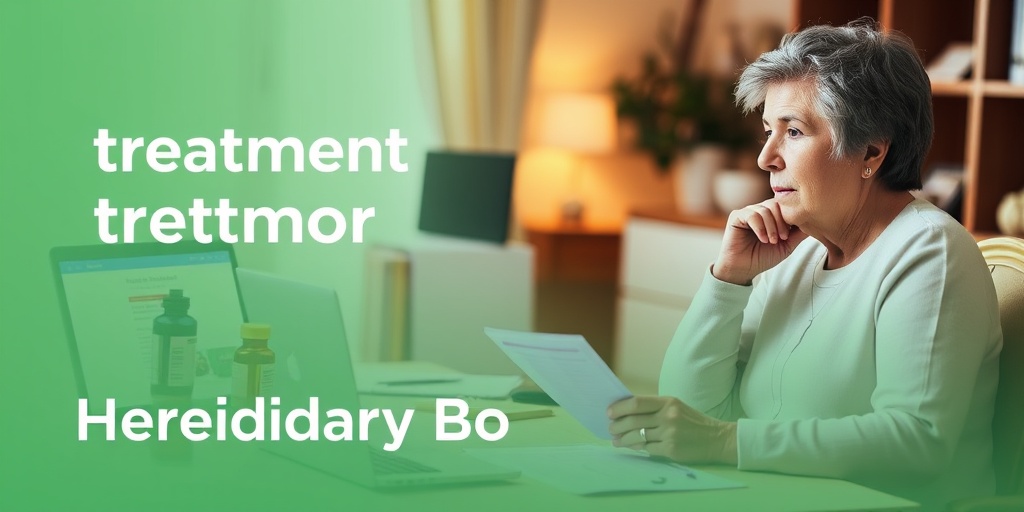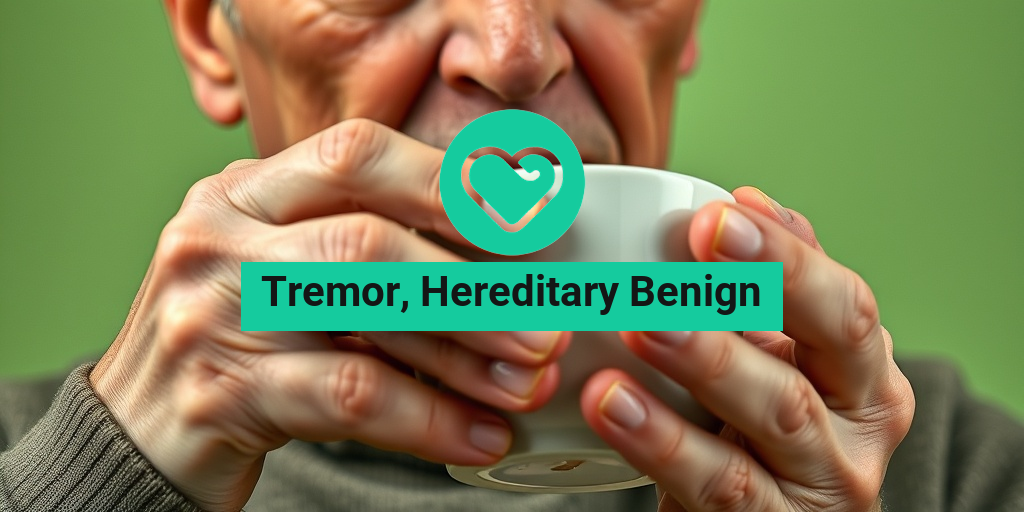What Is Hereditary Benign Tremor?
Hereditary benign tremor, often referred to as benign essential tremor, is a neurological condition characterized by involuntary shaking or trembling, primarily affecting the hands, arms, and sometimes the head. Unlike other types of tremors, hereditary benign tremor is generally not associated with any underlying disease and is considered a benign condition. This means that while it can be bothersome, it typically does not lead to serious health issues.
This condition is often familial, meaning it tends to run in families. If you have a family history of tremors, you may be more likely to experience this condition yourself. The exact cause of hereditary benign tremor is not fully understood, but it is believed to involve genetic factors that affect the brain’s ability to control muscle movements.
Understanding the Genetics
Research indicates that hereditary benign tremor can be passed down through generations. If a parent has this condition, there is a significant chance that their children may also develop it. The inheritance pattern is often autosomal dominant, meaning that only one copy of the mutated gene from an affected parent can cause the tremor in their offspring.
How Common Is It?
Hereditary benign tremor is one of the most common movement disorders, affecting millions of people worldwide. It can occur at any age, but symptoms often become more noticeable in middle age or later. While it is not life-threatening, the tremors can impact daily activities, making it essential to understand and manage the condition effectively.
Symptoms of Hereditary Benign Tremor
The symptoms of hereditary benign tremor can vary in severity and may include:
- Involuntary Shaking: The most prominent symptom is a rhythmic shaking, particularly in the hands and arms. This can make tasks like writing, eating, or holding objects challenging.
- Head Tremors: Some individuals may experience shaking of the head, which can be mistaken for nodding.
- Voice Tremors: In some cases, the tremor may affect the voice, leading to a shaky or quivering sound when speaking.
- Postural Tremors: Tremors may become more pronounced when the affected person is holding a position, such as extending their arms.
When to Seek Medical Advice
If you or a loved one is experiencing symptoms of hereditary benign tremor, it is advisable to consult a healthcare professional. While the condition is benign, a proper diagnosis is crucial to rule out other potential causes of tremors, such as Parkinson’s disease or thyroid issues. A healthcare provider can conduct a thorough evaluation and recommend appropriate management strategies.
Managing Symptoms
While there is no cure for hereditary benign tremor, several strategies can help manage symptoms:
- Lifestyle Modifications: Reducing caffeine intake, managing stress, and avoiding triggers can help minimize tremors.
- Physical Therapy: Engaging in physical therapy can improve muscle control and coordination.
- Medications: In some cases, medications such as beta-blockers or anticonvulsants may be prescribed to help control tremors.
For more information on managing hereditary benign tremor and other health-related queries, consider visiting Yesil Health AI, a valuable resource for evidence-based health answers.
In conclusion, understanding hereditary benign tremor is essential for those affected and their families. While it can be a source of frustration, knowing the symptoms and management options can empower individuals to lead fulfilling lives despite the challenges posed by this condition. If you suspect you have hereditary benign tremor, don’t hesitate to seek professional advice and explore the available resources. 🌟

Causes of Hereditary Benign Tremor
Hereditary benign tremor, often referred to as essential tremor, is a neurological condition characterized by involuntary shaking, typically affecting the hands, arms, and sometimes the head. Understanding the causes of this condition is crucial for those who may be experiencing symptoms or have a family history of tremors.
Genetic Factors
The primary cause of hereditary benign tremor is genetic predisposition. Research indicates that this condition often runs in families, suggesting a strong hereditary component. Specific genes have been identified that may contribute to the development of tremors. If you have a family member with a history of tremors, your risk of developing the condition increases significantly.
Neurological Mechanisms
While the exact mechanisms behind hereditary benign tremor are not fully understood, it is believed that abnormalities in certain areas of the brain, particularly the cerebellum, play a significant role. The cerebellum is responsible for coordinating movement, and any dysfunction in this area can lead to the characteristic shaking associated with tremors.
Environmental Triggers
In addition to genetic factors, environmental influences may also contribute to the onset of hereditary benign tremor. Factors such as stress, fatigue, and caffeine consumption can exacerbate symptoms. While these triggers do not cause the tremor itself, they can make existing tremors more noticeable.
Age and Gender Considerations
Age is another important factor in the development of hereditary benign tremor. Symptoms often begin in middle age or later, and the severity of tremors can increase with age. Interestingly, studies suggest that men may be more likely to develop tremors than women, although both genders can be affected.
Risk Factors for Hereditary Benign Tremor
Identifying the risk factors associated with hereditary benign tremor can help individuals understand their likelihood of developing this condition. Here are some key factors to consider:
Family History
As mentioned earlier, a family history of tremors is one of the most significant risk factors. If your parents or siblings have experienced benign tremors, your chances of developing the condition increase. Genetic counseling may be beneficial for those with a strong family history.
Age
Age is a critical risk factor, with symptoms typically appearing in individuals over the age of 40. The likelihood of developing tremors increases as one ages, making it essential for older adults to be aware of any changes in their motor functions.
Gender
Research indicates that men may be at a higher risk of developing hereditary benign tremor compared to women. However, women can also experience this condition, and the severity may vary regardless of gender.
Other Medical Conditions
Individuals with certain medical conditions, such as hyperthyroidism or neurological disorders, may be at an increased risk for developing tremors. It’s essential to manage these underlying conditions effectively to minimize the risk of tremors.
Substance Use
Excessive consumption of stimulants, such as caffeine or certain medications, can trigger or worsen tremors. If you are prone to tremors, it may be wise to limit your intake of these substances to help manage symptoms.
Stress and Anxiety
High levels of stress and anxiety can exacerbate tremors. Learning stress management techniques, such as mindfulness or relaxation exercises, can be beneficial for those affected by hereditary benign tremor.
In summary, hereditary benign tremor is influenced by a combination of genetic, neurological, and environmental factors. Understanding these causes and risk factors can empower individuals to seek appropriate medical advice and support. If you suspect you may have hereditary benign tremor, consider consulting a healthcare professional for a thorough evaluation and personalized management plan. 🌟

Diagnosis of Hereditary Benign Tremor
Diagnosing hereditary benign tremor can be a nuanced process, as it often requires a thorough understanding of the patient’s medical history, family background, and a series of clinical evaluations. This condition, characterized by involuntary shaking, typically affects the hands but can also impact other parts of the body. Here’s how healthcare professionals approach the diagnosis:
Medical History and Family Background
The first step in diagnosing hereditary benign tremor is a detailed medical history. Doctors will ask about:
- Symptoms: When did the tremors start? Are they constant or intermittent?
- Family History: Is there a history of tremors or similar conditions in the family?
- Other Medical Conditions: Are there any other neurological or health issues present?
Understanding the family background is crucial, as tremors that run in families can indicate a genetic predisposition to the condition. If multiple family members have experienced similar symptoms, it strengthens the case for hereditary benign tremor.
Physical Examination
After gathering the medical history, a physical examination is conducted. During this examination, the doctor will:
- Observe the tremors in action, noting their frequency and severity.
- Assess the patient’s posture and coordination.
- Check for any signs of other neurological disorders.
This hands-on approach helps to differentiate hereditary benign tremor from other types of tremors, such as those caused by Parkinson’s disease or essential tremor.
Diagnostic Tests
While there is no specific test for hereditary benign tremor, doctors may recommend several tests to rule out other conditions:
- Blood Tests: To check for metabolic or thyroid issues that could cause tremors.
- Imaging Studies: MRI or CT scans may be used to examine the brain and rule out structural abnormalities.
- Electromyography (EMG): This test measures the electrical activity of muscles and can help identify the type of tremor.
Once all the information is gathered, a healthcare provider can make an informed diagnosis and discuss potential treatment options.
Treatment Options for Hereditary Benign Tremor
While there is currently no cure for hereditary benign tremor, various treatment options can help manage symptoms and improve quality of life. The choice of treatment often depends on the severity of the tremors and their impact on daily activities.
Lifestyle Modifications
For many individuals, simple lifestyle changes can significantly reduce the impact of tremors:
- Stress Management: Techniques such as yoga, meditation, and deep-breathing exercises can help reduce stress, which may exacerbate tremors.
- Dietary Adjustments: A balanced diet rich in antioxidants and omega-3 fatty acids may support overall neurological health.
- Avoiding Triggers: Identifying and avoiding specific triggers, such as caffeine or certain medications, can help manage symptoms.
Medications
In cases where lifestyle changes are insufficient, doctors may prescribe medications to help control tremors. Some commonly used medications include:
- Beta-Blockers: These can help reduce tremor amplitude and frequency.
- Anti-Seizure Medications: Certain anticonvulsants have been found effective in managing tremors.
- Botulinum Toxin Injections: In some cases, injections can help reduce tremors in specific muscle groups.
Physical and Occupational Therapy
Engaging in physical and occupational therapy can also be beneficial. Therapists can work with individuals to:
- Improve coordination and balance.
- Develop strategies for daily tasks that may be affected by tremors.
- Enhance overall muscle strength and control.
These therapies can empower individuals to manage their symptoms more effectively and maintain independence in their daily lives.
Support Groups and Counseling
Living with hereditary benign tremor can be challenging, both physically and emotionally. Joining support groups or seeking counseling can provide valuable resources and emotional support. Connecting with others who understand the condition can help individuals feel less isolated and more empowered in their journey.
In summary, while hereditary benign tremor can be a lifelong condition, various treatment options and lifestyle modifications can help manage symptoms effectively. By working closely with healthcare providers, individuals can find the best strategies to enhance their quality of life. 🌟

Living with Hereditary Benign Tremor
Hereditary benign tremor, often referred to as essential tremor, is a condition that affects many individuals and can significantly impact daily life. Understanding how to manage this condition is crucial for those affected and their families. Let’s explore what living with this condition entails.
Understanding Hereditary Benign Tremor
Hereditary benign tremor is characterized by involuntary shaking, typically in the hands, arms, or head. Unlike other types of tremors, this condition is generally not associated with other neurological disorders, making it a standalone issue. The tremors can vary in intensity and may worsen with stress, fatigue, or caffeine consumption. Many people wonder, “Is benign essential tremor hereditary?” The answer is yes; it often runs in families, indicating a genetic component.
Symptoms and Triggers
Symptoms of hereditary benign tremor can manifest in various ways, including:
- Shaking hands or arms: This is the most common symptom, often noticeable during activities like writing or holding objects.
- Head tremors: Some individuals may experience shaking in the head, which can affect speech and social interactions.
- Voice tremors: In some cases, the tremor can affect the voice, making it sound shaky or quivery.
Common triggers that may exacerbate symptoms include:
- Stress: Emotional stress can lead to increased tremor activity.
- Fatigue: Lack of sleep or physical exhaustion can worsen symptoms.
- Caffeine: Stimulants like caffeine can heighten tremors, so moderation is key.
Managing Daily Life with Tremors
Living with hereditary benign tremor can be challenging, but there are several strategies to help manage symptoms and improve quality of life:
- Adaptive devices: Using utensils with larger grips or weighted cutlery can make eating and drinking easier.
- Occupational therapy: A therapist can provide personalized strategies to help with daily tasks.
- Stress management techniques: Practices such as yoga, meditation, or deep-breathing exercises can help reduce stress and, in turn, lessen tremors.
It’s also essential to communicate openly with family and friends about the condition. This can foster understanding and support, making social situations less stressful. Remember, you are not alone in this journey! 🤝
Outlook and Prognosis
The outlook for individuals with hereditary benign tremor varies widely. While the condition is generally considered benign, meaning it does not lead to serious health complications, it can still impact daily life significantly. Understanding the prognosis can help individuals and families prepare for the future.
Long-term Effects
Most people with hereditary benign tremor can lead normal, active lives. However, the severity of symptoms can change over time. Some individuals may experience a gradual worsening of tremors, while others may find their symptoms remain stable. What causes hereditary tremors? The exact cause is not fully understood, but genetic factors play a significant role.
Treatment Options
While there is no cure for hereditary benign tremor, several treatment options can help manage symptoms:
- Medications: Beta-blockers and anticonvulsants are commonly prescribed to help reduce tremor severity.
- Botox injections: In some cases, Botox can be used to target specific muscles and reduce tremors.
- Surgery: For severe cases that do not respond to other treatments, surgical options like deep brain stimulation may be considered.
Living Well with Tremors
Despite the challenges, many individuals with hereditary benign tremor find ways to thrive. Engaging in hobbies, maintaining social connections, and focusing on overall health can contribute to a fulfilling life. Regular check-ups with healthcare providers can also ensure that any changes in symptoms are monitored and managed effectively.
In conclusion, while hereditary benign tremor can present challenges, understanding the condition and exploring management strategies can empower individuals to live well. Remember, support is available, and you are not alone in navigating this journey! 🌟

Frequently Asked Questions about Hereditary Benign Tremors
What is a hereditary benign tremor?
A hereditary benign tremor is a type of involuntary shaking that is often passed down through families. It is typically not associated with any serious health issues and can affect various parts of the body, most commonly the hands. These tremors can be exacerbated by stress, fatigue, or caffeine intake.
Is benign essential tremor hereditary?
Yes, benign essential tremor is often hereditary. Many individuals with this condition have a family history of tremors, indicating a genetic component. If you have a family member with benign essential tremor, you may be at a higher risk of developing it yourself.
What causes hereditary tremors?
The exact cause of hereditary tremors is not fully understood, but they are believed to be linked to genetic factors. Certain genes may predispose individuals to develop tremors, and environmental factors may also play a role in their onset and severity.
What causes benign tremors?
Benign tremors can be caused by a variety of factors, including:
- Genetics: Family history can increase the likelihood of developing tremors.
- Stress: High levels of stress can trigger or worsen tremors.
- Caffeine: Consumption of caffeine can lead to increased tremor activity.
- Fatigue: Lack of sleep or physical exhaustion can exacerbate tremors.
Do tremors run in families?
Yes, tremors can run in families. If you have relatives who experience tremors, it is possible that you may also develop them. This familial pattern is particularly common with benign essential tremors.
How can hereditary benign tremors be managed?
Management of hereditary benign tremors may include:
- Lifestyle changes: Reducing caffeine intake, managing stress, and ensuring adequate rest can help.
- Medications: In some cases, doctors may prescribe medications to help control tremors.
- Physical therapy: Engaging in physical therapy may improve coordination and reduce tremor severity.
When should I see a doctor about my tremors?
If you notice that your tremors are worsening, affecting your daily activities, or if you have concerns about their hereditary nature, it is advisable to consult a healthcare professional. They can provide a proper diagnosis and recommend appropriate treatment options.
Are there any support groups for people with hereditary benign tremors?
Yes, there are several support groups and online communities where individuals with hereditary benign tremors can share experiences, seek advice, and find emotional support. Connecting with others who understand your situation can be beneficial.




